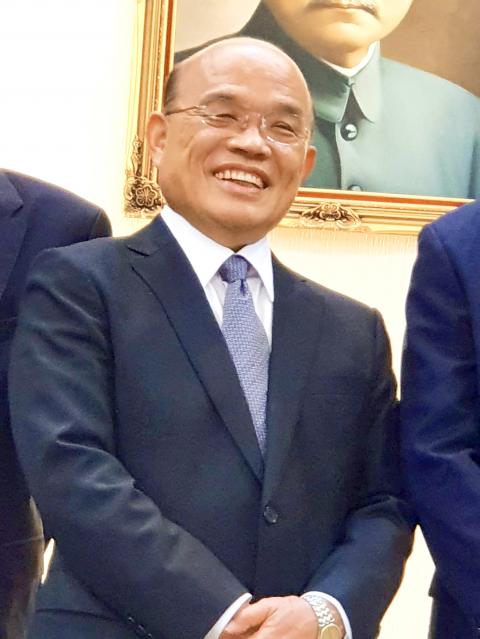Premier Su Tseng-chang (蘇貞昌) yesterday approved three plans proposed by the Ministry of Economic Affairs aimed at attracting an estimated NT$1.175 trillion (US$37.7 billion) of investment and 104,000 job opportunities over three years.
To encourage overseas Taiwanese to invest in Taiwan the government implemented the Action Plan for Welcoming Overseas Taiwanese Businesses to Return to Invest in Taiwan, which was funded by the National Development Fund.
However, due to the popularity of the scheme, the NT$20 billion allocated to the action plan has already been exhausted.

Photo: Li Hsin-fang, Taipei Times
As a result, a second edition of the plan, or Action Plan for Welcoming Overseas Taiwanese Businesses to Return to Invest in Taiwan 2.0, one of the three plans approved, was drafted.
The new plan promises an additional NT$500 billion in subsidies to overseas businesses returning to invest in Taiwan.
Under the new plan, the government is to subsidize 0.5 percent of the processing fees for businesses borrowing less than NT$2 billion, 0.3 percent for businesses borrowing NT$2 billion to NT$10 billion, and 0.1 percent for businesses borrowing more than NT$10 billion.
The loans must be repaid in five years, down from 10 years under the original plan.
The subsidies are to become available after the regulations have been confirmed, Deputy Minister of Economic Affairs Wang Mei-hua (王美花) said.
Meanwhile, the other two plans approved seek to extend the benefits to large businesses that have remained in Taiwan, as well as small and medium-sized enterprises.
Subsidies for the former group would be given according to the same rules that apply to overseas businesses returning to invest in Taiwan, while the latter would get a 1.5 percent subsidy.
The two groups are to be offered NT$80 billion and NT$20 billion in subsidies respectively.
The two plans are to take effect on July 1, Wang said.
The three plans would benefit not only businesses returning from abroad to invest in Taiwan, but also large enterprises that have never invested in China and small and medium-sized enterprises, Su said at a Cabinet meeting.
In addition to the subsidies, all three plans also have dedicated points of contact to help businesses secure land, water and electricity, and handle taxes, he said.
The government wants to show the corporate world and the public that it is determined to boost the economy, Su said.
It wants to demonstrate its effectiveness in reviewing applications, its flexibility in implementing plans and that it can “keep up with trends” and make adjustments as needed, he said.
The Cabinet on May 31 raised the foreign worker quota from 10 percent to 15 percent for multiple businesses, including Accton Technology Corp (智邦科技), the first company to be approved under the original action plan.
Additional reporting by CNA

CHAOS: Iranians took to the streets playing celebratory music after reports of Khamenei’s death on Saturday, while mourners also gathered in Tehran yesterday Iranian Supreme Leader Ayatollah Ali Khamenei was killed in a major attack on Iran launched by Israel and the US, throwing the future of the Islamic republic into doubt and raising the risk of regional instability. Iranian state television and the state-run IRNA news agency announced the 86-year-old’s death early yesterday. US President Donald Trump said it gave Iranians their “greatest chance” to “take back” their country. The announcements came after a joint US and Israeli aerial bombardment that targeted Iranian military and governmental sites. Trump said the “heavy and pinpoint bombing” would continue through the week or as long

TRUST: The KMT said it respected the US’ timing and considerations, and hoped it would continue to honor its commitments to helping Taiwan bolster its defenses and deterrence US President Donald Trump is delaying a multibillion-dollar arms sale to Taiwan to ensure his visit to Beijing is successful, a New York Times report said. The weapons sales package has stalled in the US Department of State, the report said, citing US officials it did not identify. The White House has told agencies not to push forward ahead of Trump’s meeting with Chinese President Xi Jinping (習近平), it said. The two last month held a phone call to discuss trade and geopolitical flashpoints ahead of the summit. Xi raised the Taiwan issue and urged the US to handle arms sales to

BIG SPENDERS: Foreign investors bought the most Taiwan equities since 2005, signaling confidence that an AI boom would continue to benefit chipmakers Taiwan Semiconductor Manufacturing Co’s (TSMC, 台積電) market capitalization swelled to US$2 trillion for the first time following a 4.25 percent rally in its American depositary receipts (ADR) overnight, putting the world’s biggest contract chipmaker sixth on the list of the world’s biggest companies by market capitalization, just behind Amazon.com Inc. The site CompaniesMarketcap.com ranked TSMC ahead of Saudi Aramco and Meta Platforms Inc. The Taiwanese company’s ADRs on Tuesday surged to US$385.75 on the New York Stock Exchange, as strong demand for artificial intelligence (AI) applications led to chip supply constraints and boost revenue growth to record-breaking levels. Each TSMC ADR represents

State-run CPC Corp, Taiwan (CPC, 台灣中油) yesterday said that it had confirmed on Saturday night with its liquefied natural gas (LNG) and crude oil suppliers that shipments are proceeding as scheduled and that domestic supplies remain unaffected. The CPC yesterday announced the gasoline and diesel prices will rise by NT$0.2 and NT$0.4 per liter, respectively, starting Monday, citing Middle East tensions and blizzards in the eastern United States. CPC also iterated it has been reducing the proportion of crude oil imports from the Middle East and diversifying its supply sources in the past few years in response to geopolitical risks, expanding